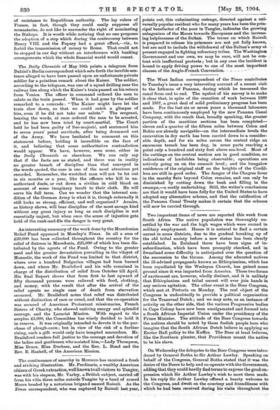The Daily Chronicle of May 16th prints a telegram from
Dalziel's Berlin correspondent which sets forth the terrible sen- tence alleged to have been passed upon an unfortunate private soldier for a pointless remark about the Kaiser. The soldier, according to the telegram, was one of a squad drilling near the railway line along which the Kaiser's train passed on his return from Venice. The officer in command ordered the men to salute as the train passed. When it had gone by the soldier remarked to a comrade : "The Kaiser might have let the train slow down, so that we could catch a glimpse of him, even if he did not take our salute." The sergeant, hearing the words, at once ordered the man to be arrested, and he has now been tried by court-martial. The Court held be had been guilty of lese-majeste, and sentenced him to seven years' penal servitude, after being drummed out of the Army. We have hesitated to comment on this statement before, holding it incredible on the face of it, and believing that some authoritative contradiction would appear. We have, however, seen none, either in the Daily Chronicle or elsewhere. We can only say that if the facts are as stated, and there was in reality no greater breach of discipline than that conveyed in the words quoted, the case is one of the most atrocious yet recorded. Remember, the wretched man will not be let out in six months or a year, like the officers who kill in un- authorised duels, or cut down a civilian in cold blood on account of some imaginary insult to their cloth. He will serve his full term. Can we wonder that the internal con- dition of the German Army is what it is, though externally it still looks so strong, efficient, and well organised ? Armies, as history shows, will bear discipline of the most savage kind without any great injury as long as such discipline is not essentially unjust, but when once the sense of injustice gets hold of the rank-and-file the danger is very great.






































 Previous page
Previous page